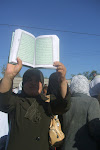Ramadan Karim
We have just completed the forth and ultimate week of Ramadan, lived with particular fervour and excitement.
Ramadan is a strange mixture of Lent and Christmas: An austere Lent since between sunrise and sunset he faithful partake of neither food nor water and by the temperatures we have known, this was no mean achievement – and no smoking either!. Tulkarem, in its basin gets swelteringly hot. Prayers start between 3 and 4 a.m. (According to the sun). One hour earlier the drums have been played all over the city to let people know that they had an hour left to eat and drink This comes as a shock at first but we got used to it.
Now, when the muezzin calls around 6 p.m., fireworks salute the end of the fast, silence descends on the place as everyone sits to a celebratory meal. We were invited to such a feast by our butcher. We were treated to diverse cuts of lamb slow-cooked in the oven with a selection of aubergines, courgettes, tomatoes, garlic, onions, chilli, all fresh from the land some farmers have to fight so hard to tend. The fruit and vegetables here are to die for – and indeed we were treated to a wonderful fruit salad before Ramadan sweetmeats were finally set before us. When the meal is over, the town is a-buzz into the small hours.
This is a time of intense and visible piety. Men in particular are seen everywhere prayer beads in hand or reading the Qu’ran and we see quite a few drift to the mosque for prayer as we set off on our duties at 4 a.m. Ramadan fasting is an exercise in restraint and must be engaged in in the right spirit. It is undertaken for the forgiveness of one’s sins and the betterment of one’s soul and a greater awareness of God’s inner presence. The prophet is quoted as saying “If one does not abandon falsehood in words and deeds, Allah has no need for his abandoning of his food and drink”.
We EAs are expected to show respect. This entails not eating or drinking in public. This took some doing on the day that, on duty at a checkpoint, a gentleman stopped the taxi that was taking him home to offer us, “Ramadan Karim”, some scrumptious confection fresh from Nablus, the capital of sweetmeats. Ramadan is also a time of generosity (karim) of giving to the poor. A great necessity since so many are unemployed (nearly 30% in Tulkarem) and, like at Christmas in our country, NGOs and relief organisations are busy distributing food parcels to those in the direst circumstances. Eid, the end of Ramadan is a major festival marked by the consumption of special foods as well as the heaping of gifts on the children. The market stalls with their abundance of fruit of every kind, their dates, their garishly coloured pickles and varied goodies, the flashing stars and crescents adorning some doors or window frames and streets have a rather disconcerting Christmas flavour.
Another aspect of Ramadan is the Hadj, the pilgrimage. The Faithful must go and pray in Jerusalem, at the Al Aqsa Mosque for the men and at the dome of the Rock for the women. Which would be fine if East-Jerusalem had not been unilaterally annexed by Israel who then proceeded to deny entry to the Palestinians. It would argue that “for security reasons” it has to screen those entering the Holy City. To this end, it has devised Kafkaesque rules regarding the ages of males and females to whom permits may be issued to go and pray on the Temple Mount, permits, which have to be individually checked with the result that what should be a time of devotion is turned into pandemonium. I walked through the checkpoint with the women last Friday, it took me over an hour to cover 10 meters in a press that was quite frightening at times. At Qalandya the checkpoint to the North of Jerusalem, the brutality was such that children had to be lifted away from the fences and passed overhead to (relative) safety. My colleague, Ann who was present wrote to me that: "It was surreal, I can still not believe I saw soldiers on horseback going into crowds of women, or soldiers hitting women old enough to be their grandmothers! It's like a vision of hell that if you didn't have it on film you wouldn't have believed you saw."
The young women we meat at the refugee camp could not even go at all; as they pointedly observed: “you can go to Jerusalem and yet we, who live here can’t.”
Thursday, 1 October 2009
Subscribe to:
Post Comments (Atom)



No comments:
Post a Comment